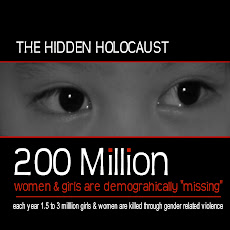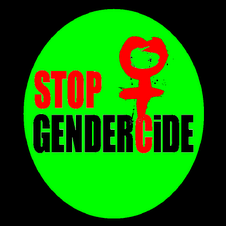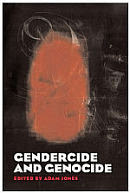After many frustrating years of political lobbying and
advocacy work to get the US government to take a stand against the practice of
Gendercide, this summer Chai Ling, founder of All Girls Allowed accomplished
it! Her organization got Congressional commitment
through the signing of the “Declaration to End Gendercide”. The document cites Arts. 2 & 3 of the
Universal Declaration of Human Rights, hence condemning the systematic
elimination of girls occurring in India and China.
Please join me in supporting the work “All Girls Allowed” is doing to address Gendercide by going to All Girls Allowed and get involved and/or contribute.
__________________________________________________________
U.S. Takes Action Against 'Gendercide'
Kanya D'Almeida
WASHINGTON, Jun 1 (IPS) - Every year on Jun. 1, the People's Republic of China pulls out all the stops – hosting festivals, printing greeting cards and sponsoring public games and parades – in celebration of International Children's Day, a holiday widely acknowledged to have originated with the rise of communism and now observed primarily in communist or former communist countries.
This year, while Chinese schoolchildren were enjoying a day free of homework along with state-sponsored festivities, human rights activists, demographers and researchers gathered in Washington to denounce the dark side of China's attitude towards its young – the rise of "gendercide" thought to be associated with the One- Child Policy (OCP).
In one of the first major gestures of bipartisan collaboration all year, Republican and Democratic members of Congress came together Wednesday on Capitol Hill to sign the Declaration to End Gendercide, a document drafted by the fledgling non-profit All Girls Allowed that has grown rapidly into one of the leading organisations currently tackling human rights abuses in China.
Evoking articles two and three of the Universal Declaration of Human Rights, it "condemns the systematic elimination of girls occurring in India and China" and calls on families, communities and governments to educate, nurture and aggressively protect the lives of young girls the world over.
"We need to create a society where every child will be considered an asset, not a liability," T. Kumar, advocacy director for Asia and the Pacific at Amnesty International, stressed.
A former student leader of the Tiananmen Square youth movement and two-time Nobel Peace Prize nominee Chai Ling, founder of All Girls Allowed, said in reference to the reported wave of infanticide across China, "I knew I had to do something when I realised that a Tiananmen Square massacre is taking place in China every single day."
In the 30 years since China implemented the OCP, one million infants are abandoned annually and 35,000 government-enforced abortions are performed every year.
Zhang Yuhong, a victim of forced abortion, recounted her own personal story of becoming pregnant despite being implanted with an IUD against her own will after her first child was born.
Confronted by state forces, Yuhong and her husband were threatened with deprivation of food rations and a ban on their second child's education if they went ahead with the second birth. Under tremendous pressure, Yuhong finally had her pregnancy terminated in a government clinic with no anesthesia, and no compensation for her loss or her emotional trauma.
"That's why I'm here today," she said, "to urge the people of the world to come together to halt these inhuman policies happening in China."
Infanticide and Gender Imbalances
Nestled among tales of personal tragedy and pages of statistics relating to infanticide are clear patterns of gender imbalance.
Last January, the Chinese Academy of Social Sciences (CASS) predicted that by 2020, Chinese boys below the age of 19 would outnumber their female counterparts by 30-40 million – double the total young male population of Europe's three largest countries combined.
Such disparities lie far outside the boundaries of what nature would normally allow. Several months ago The Economist reported that since boys are slightly more likely to die in infancy than girls, biological adaptation compensates by ensuring more male births at an average ratio of 100:103 or at times 100:106 female to male births – a number that has held so steady for centuries that it is considered to be the natural order of things.
However, this pattern experienced a radical change over the past 25 years, and nowhere is evidence of the shift more prominent than in China. According to the British Medical Journal, the sex ratio for the generation of children born in China between the years 2000-2004 hit an unprecedented 100:124.
"This disproportion is out of sync with anything we've ever seen in history and is biologically impossible," Nicholas Eberstadt, a senior demographer at the American Enterprise Institute, told reporters Wednesday. "It is the combined result of the proliferation of inexpensive prenatal sex-determination technology and declining fertility."
Unlike many of those gathered on Capitol Hill, Eberstadt did not place blame exclusively on China's OCP, pointing out that systematic gendercide is scattered across the global map, with lopsided ratios tipping the gender scales in the Caucasus and Central Asia, as well as in parts of South Asia.
"This crisis is not specific to one law, one region or even one religion," he said.
"It occurs in societies that are Buddhist, Confucian, Hindu, Muslim and Christian. It even happens in the United States," he added, referring to the increasingly imbalanced sex ratio in the Asian American community, which increased from 100:106 in the mid 1970s to 100:109 in early 2002.
"Let's not tell ourselves that this can't happen here," Eberstadt warned, "because it already is."
The U.S. is well-placed to act nationally in order to have an impact on China in the international arena.
"We want the U.S. to lead by example," Ling told IPS. "We want this government to educate the world and act on behalf of girls everywhere. First there must be awareness on the issue – only then can we move forward."
Please join me in supporting the work “All Girls Allowed” is doing to address Gendercide by going to All Girls Allowed and get involved and/or contribute.
__________________________________________________________
U.S. Takes Action Against 'Gendercide'
Kanya D'Almeida
WASHINGTON, Jun 1 (IPS) - Every year on Jun. 1, the People's Republic of China pulls out all the stops – hosting festivals, printing greeting cards and sponsoring public games and parades – in celebration of International Children's Day, a holiday widely acknowledged to have originated with the rise of communism and now observed primarily in communist or former communist countries.
This year, while Chinese schoolchildren were enjoying a day free of homework along with state-sponsored festivities, human rights activists, demographers and researchers gathered in Washington to denounce the dark side of China's attitude towards its young – the rise of "gendercide" thought to be associated with the One- Child Policy (OCP).
In one of the first major gestures of bipartisan collaboration all year, Republican and Democratic members of Congress came together Wednesday on Capitol Hill to sign the Declaration to End Gendercide, a document drafted by the fledgling non-profit All Girls Allowed that has grown rapidly into one of the leading organisations currently tackling human rights abuses in China.
Evoking articles two and three of the Universal Declaration of Human Rights, it "condemns the systematic elimination of girls occurring in India and China" and calls on families, communities and governments to educate, nurture and aggressively protect the lives of young girls the world over.
"We need to create a society where every child will be considered an asset, not a liability," T. Kumar, advocacy director for Asia and the Pacific at Amnesty International, stressed.
A former student leader of the Tiananmen Square youth movement and two-time Nobel Peace Prize nominee Chai Ling, founder of All Girls Allowed, said in reference to the reported wave of infanticide across China, "I knew I had to do something when I realised that a Tiananmen Square massacre is taking place in China every single day."
In the 30 years since China implemented the OCP, one million infants are abandoned annually and 35,000 government-enforced abortions are performed every year.
Zhang Yuhong, a victim of forced abortion, recounted her own personal story of becoming pregnant despite being implanted with an IUD against her own will after her first child was born.
Confronted by state forces, Yuhong and her husband were threatened with deprivation of food rations and a ban on their second child's education if they went ahead with the second birth. Under tremendous pressure, Yuhong finally had her pregnancy terminated in a government clinic with no anesthesia, and no compensation for her loss or her emotional trauma.
"That's why I'm here today," she said, "to urge the people of the world to come together to halt these inhuman policies happening in China."
Infanticide and Gender Imbalances
Nestled among tales of personal tragedy and pages of statistics relating to infanticide are clear patterns of gender imbalance.
Last January, the Chinese Academy of Social Sciences (CASS) predicted that by 2020, Chinese boys below the age of 19 would outnumber their female counterparts by 30-40 million – double the total young male population of Europe's three largest countries combined.
Such disparities lie far outside the boundaries of what nature would normally allow. Several months ago The Economist reported that since boys are slightly more likely to die in infancy than girls, biological adaptation compensates by ensuring more male births at an average ratio of 100:103 or at times 100:106 female to male births – a number that has held so steady for centuries that it is considered to be the natural order of things.
However, this pattern experienced a radical change over the past 25 years, and nowhere is evidence of the shift more prominent than in China. According to the British Medical Journal, the sex ratio for the generation of children born in China between the years 2000-2004 hit an unprecedented 100:124.
"This disproportion is out of sync with anything we've ever seen in history and is biologically impossible," Nicholas Eberstadt, a senior demographer at the American Enterprise Institute, told reporters Wednesday. "It is the combined result of the proliferation of inexpensive prenatal sex-determination technology and declining fertility."
Unlike many of those gathered on Capitol Hill, Eberstadt did not place blame exclusively on China's OCP, pointing out that systematic gendercide is scattered across the global map, with lopsided ratios tipping the gender scales in the Caucasus and Central Asia, as well as in parts of South Asia.
"This crisis is not specific to one law, one region or even one religion," he said.
"It occurs in societies that are Buddhist, Confucian, Hindu, Muslim and Christian. It even happens in the United States," he added, referring to the increasingly imbalanced sex ratio in the Asian American community, which increased from 100:106 in the mid 1970s to 100:109 in early 2002.
"Let's not tell ourselves that this can't happen here," Eberstadt warned, "because it already is."
The U.S. is well-placed to act nationally in order to have an impact on China in the international arena.
"We want the U.S. to lead by example," Ling told IPS. "We want this government to educate the world and act on behalf of girls everywhere. First there must be awareness on the issue – only then can we move forward."














